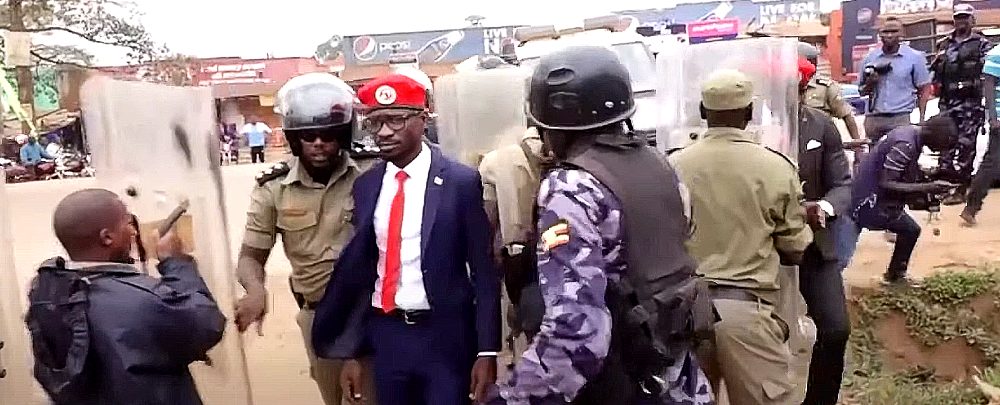
Ugandan opposition leader Bobi Wine being arrested earlier this year. (Image: VOA/Screen capture)
Uganda’s 2021 election season started off in November with the arrest of a leading opposition candidate after he came under a volley of bullets, the advancing of the election date by two months to January 14, and the shooting by Ugandan police of opposition supporters who had gathered for a rally, many of them as they swam through a Kampala swamp to avoid the carnage. Over 50 people were killed.
This is not the campaign President Yoweri Museveni and the ruling National Resistance Movement (NRM) anticipated. In power since 1986 and seeking his 6th term after sidestepping constitutional term and age limits, the 76-year-old Museveni was seeking an uneventful continuation of his rule.
Instead, he has encountered a highly energized youth movement that is calling for change, including the transition to a genuine democracy. The opposition is led by musician-turned-legislator Robert Kyagulanyi Sentamu, aka Bobi Wine, and his People Power movement.
“[Museveni] has encountered a highly energized youth movement that is calling for change, including the transition to a genuine democracy.”
The 38-year-old jumped to prominence composing songs critical of political injustice and in the process tapped a deep reservoir of frustration among youth who chafe at the NRM’s claim of perpetual entitlement. While Wine has garnered most of the attention, there are 11 opposition candidates competing in the first round of presidential polls.
The NRM is attempting to blunt the momentum of the opposition through a series of restrictive measures. Wine has been arrested several times in recent years, and reportedly beaten and tortured, under a colonial-era law—the Habitual Criminals (Preventive Detention) Act of 1951—which allows the incarceration of anyone suspected of committing a crime, even before it occurs. The law was used to detain Wine on the grounds of the Electoral Commission minutes after he was certified as a presidential candidate on November 3. Police claim his offense was planning an “illegal procession” without police permission that threatens domestic tranquility.
The NRM is also invoking the Communications Act, which blocks critical reporting and can be wielded to disrupt access to Uganda’s 200 or so privately owned radio stations. An antiterrorism law allows private communications to be intercepted without a warrant. Another compels internet providers to ensure their systems can intercept communications without the user’s knowledge. In 2019, millions quit social media after a tax was imposed to “tame idle talk” across 60 platforms including Facebook and WhatsApp.
The 2013 Public Order Management Act outlaws public gatherings without police approval. In 2020, the Constitutional Court nullified one section, calling it illegal, but left the Act in place. The Stage Play and Public Entertainment Rules of 2019 require musicians, artists, and entertainers to submit content for approval and obtain government permission to perform.
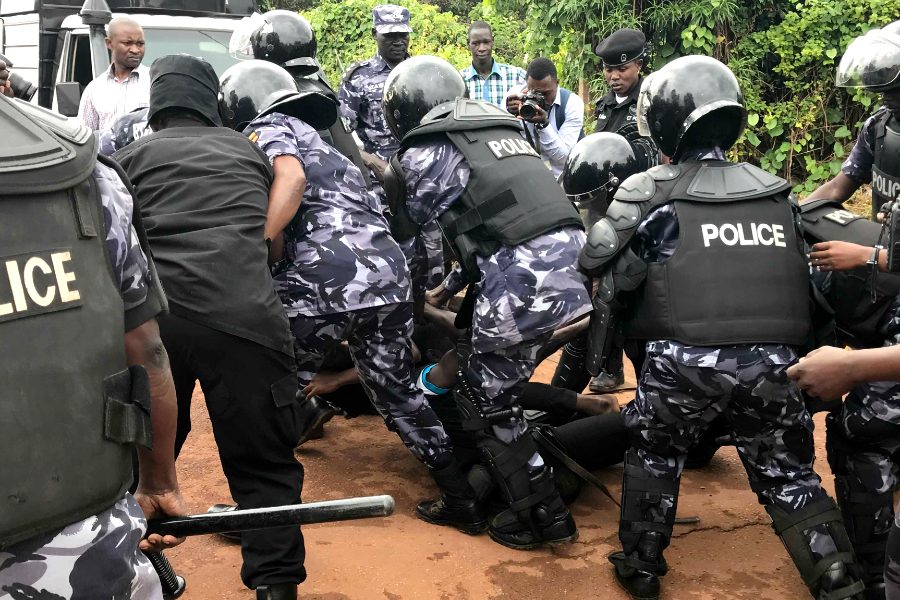
Uganda police arresting a protester. (Photo: VOA)
Such are the systemic impediments that hamper Uganda’s ability to hold genuinely democratic elections. The NRM’s open use and justification of violence against its political opponents, moreover, drops any pretense that this will be a free and fair political competition of ideas.
Unwilling to legitimize such efforts, the European Union has refused to send observers to the polls. It has said none of the 30 recommendations it offered to address deficiencies identified from the 2016 elections have been implemented. These include legal reforms, equitable media access, public participation in selecting Commissioners of the Election Commission, and making the Commission independent from executive control. A coalition of independent MPs similarly sponsored a bill in 2019 containing comprehensive reforms. However, this was blocked by the NRM’s parliamentary supermajority of 393 seats out of 426.
Uganda thus heads into another election with a series of structural factors intended to produce a predetermined outcome. The ideological competition unfolding in Uganda, however, extends beyond the election to alternative visions for the direction of the country.
The Intergenerational Divide and Intensifying Culture Wars
The NRM has gone to extraordinary lengths to suppress the People Power Movement and its political wing, the National Unity Platform. This underscores the intergenerational fracture between the older, post-independence generation and those born after the NRM came to power in 1986, which makes up the overwhelming majority of voters. Unlike older generations, they are not as deferential to the NRM’s claims to legitimacy owing to its armed struggle.
“The People Power movement repudiates the NRM as the ‘old order,’ out of touch with new realities and fundamentally corrupt, violent, and insensitive.”
In January 2020, Museveni, clad in full battle gear, led a 195-kilometer trek dubbed “Afrika Kwetu” (“Our Africa”) to Luweero district, the historical stronghold where the NRM launched its war. It sought to re-legitimize itself by “educating youth not to take their freedoms for granted.” In the 1990s, Uganda’s youth broadly welcomed previous marches. The youth of today are not as responsive to the NRM’s message. In November, the People Power campaign attracted larger crowds in Luweero than the NRM, despite the daytime curfew it imposed to keep supporters away from Wine’s rallies.
Uganda has one the world’s youngest populations: 78 percent are under 35, including 8 million aged 15-30. Yet it also has one of the highest rates of youth unemployment, blamed on state corruption. Many of these youth dwell in informal settlements in urban and peri-urban areas and have been dismissed as “bayaaye” (rebellious hoodlums). Aware of their growing political influence, these youth have embraced the pejorative term as a political identity, describing themselves as the “unwashed ghetto youth.” They comprise the base of Wine’s support.
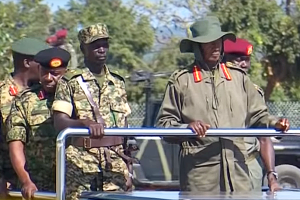
Yoweri Museveni at a military rally. (Image: Screen capture)
Channeling these feelings of alienation, the People Power movement has increasingly expanded its support among other youths, including the well-to-do. Consequently, the bayaaye have moved from the fringes to the center, redefining the issues and debates within Uganda. The People Power movement repudiates the NRM as the “old order,” out of touch with new realities and fundamentally corrupt, violent, and insensitive.
During protests, People Power activists have shown less fear of state coercion and are more defiant of authority than former electorates. This trend first appeared in the 2011 polls and has hardened over time. Wine, himself a product of youth unemployment and homelessness, embodies these dynamics. He graduated from Kampala’s slums as a reggae artist, a genre with a huge following that has long been treated with suspicion due to its embrace of the lower class and anti-establishment themes. Since 2016, Uganda’s government has stopped more than 100 concerts by Wine and other reggae artists. In defiance, they ventured outside the country to draw international attention to their cause.
In September 2018, Steven Marley, son of the late Bob Marley—who himself wrote numerous songs for anti-colonial and anti-apartheid movements—and Grammy Award-winning Morgan Heritage wrote a song for Bobi Wine, who was at the time detained on treason charges. It went viral in Uganda and East Africa. Wine visited the Marley family and Heritage in Jamaica in 2019 and 2020, where he was also received by Julius Garvey, son of the revered founder of the Global Pan-African Movement, the late Marcus Garvey, and Prime Minister Andrew Holnes.
In May 2020, Wine and Bob Marley’s contemporary, Buju Banton, organized a concert in Kenya to inspire Ugandan and East African youth to “reclaim and redefine” Pan-African liberation and free themselves from “mis-leaders” clinging to power.
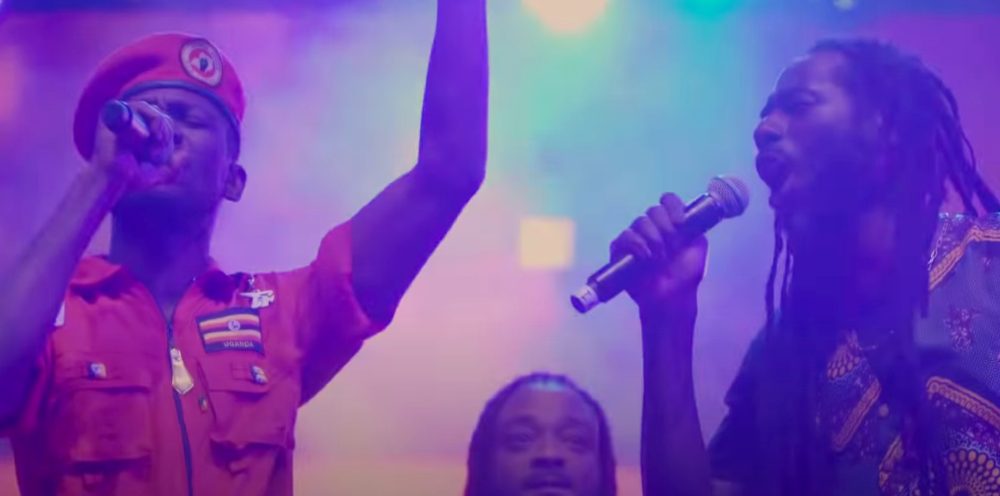
Bobi Wine and Buju Banton performing in Kenya in 2020. (Image: Buju Banton/Screen capture)
Museveni, the official patron of the Pan-African Movement and one-time follower of Marcus Garvey, found himself in an awkward spot. He has attempted to reboot his image to focus on connecting with the “bazukulu” (grandchildren), which has become a standard theme in his public addresses. “No one can lecture me about youths,” he often says. Wine countered with a series of messages questioning the president’s moral authority to position himself as an attentive “grandfather” noting that it is taboo in African culture for grandparents to harm bazukulu, a direct reference to how Museveni’s security forces treat People Power supporters.
To regain the narrative, Museveni appointed one of Wine’s former reggae associates as his presidential advisor on “ghetto affairs.” Next, he recruited and financed many local musicians, including Wine’s former peers, to compose songs of praise and mobilize youth around the NRM. Third, he embarked on releasing his own singles to push out his message to youth.
However, coercion was never far away. Wine and African artists sympathetic to the People Power movement are blocked from performing in Uganda. In December 2019, Ugandan authorities deported renowned South African anti-apartheid cultural icon and African Union Goodwill Ambassador Yvonne Chaka Chaka, drawing consternation in South Africa and wider African circles.
In 2018, she had joined a chorus of African and Jamaican voices demanding Bobi Wine’s release and the dropping of treason charges. She compared him to a “younger Nelson Mandela” and said South Africans admired him as a rising leader. During her December 2019 Uganda visit, she praised Wine again, telling him that “the old guard is messing up, and don’t fail these children of Uganda.” She was expelled the following day.
The Growing Partisanship of the Security Services
As a national liberation movement, the Uganda People’s Defense Force (UPDF) retains revolutionary practices that blur the line between civilian and military. It nevertheless prides itself for achieving a level of professionalism as it transitioned to a government army. However, as Uganda’s political space narrowed, so too did the line between the military and politics. The UPDF was not overtly visible in the 1996 elections. This changed in 2001 when the NRM faced an internal challenge from the then active-duty senior officer, Kizza Besigye. The polls were marred by running battles between the police and UPDF versus his supporters, made worse when he was accused of launching an armed rebellion. The tensions intensified in 2006 and 2011 as more soldiers and senior civilians deserted the NRM and the opposition grew.
By 2016, the UPDF was increasingly used as part of the NRM’s enforcement machinery breaking up rallies, raiding opposition offices, and surveilling rival candidates. Nonetheless, political statements by military officers were swiftly denounced by the top leadership, as happened when then Chief of Defense Forces, General Katumba Wamala, issued the explicit guidance that “All army officers are cautioned not to dare engage in politics.”
“I have been hearing some people saying ‘we will demonstrate.’ … We will deal with you, we shall crush you.”
During the 2020 election cycle, more uniformed leaders openly declared they would not obey an NRM outsider. While reminders of the army’s apolitical position have come from the army spokesperson, partisan declarations continue. In August 2019, General Kahinda Otafiire, the Justice Minister and member of the UPDF Historical High Command, announced that the slogan “People Power” belonged to the NRM, which would defend it “using the people’s army and air force.” This echoed the UPDF Land Forces Commander and High Command member, General Peter Elwelu, who said that if Wine and his parliamentary allies dared to fight, the army would not hesitate to storm the chambers to “instantly crush” them. In December 2019, then deputy government spokesperson, the late Colonel Shaban Bantariza, said, “I pity people who think the NRM government will hand over power.” Shortly thereafter, Brigadier General Deus Mande, Commandant of the Armored Warfare School, vowed that the UPDF would never allow Wine to be its Commander in Chief. This was repeated in January 2020 by Captain Sula Serunjogi, a highly decorated war veteran who addressed soldiers at the Africa Kwetu trek.
After the November 2020 protests, Security Minister General Elly Tumwine, a member of the National Security Council and Historical High Command, warned that “the police have the right to shoot and kill citizens if they go beyond a certain level of decency.” These statements mirror some of Museveni’s own messaging. In July 2020, he warned, “I have been hearing some people saying ‘we will demonstrate.’ … We are also here waiting for you, we will deal with you, we shall crush you.” In August, he called Bobi Wine’s supporters “idiots,” saying they had no right to insult him. “They will soon see what NRM means; we are going to crush those criminals and any policeman who fails to discipline [them] will go to look after goats.”
In response, the People Power movement recirculated a Bobi Wine song on social media addressed to the “Afande” (officers): “You are fighting us but we are fighting for you… even if you do these things under instructions, you are still a human being. Whatever situations oppress us oppress you too.”
Compromised Institutions
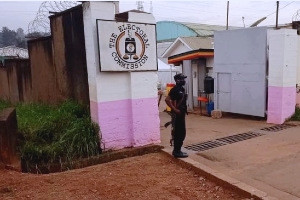
Entrance to Uganda’s Electoral Commission.
(Photo: Uganda Electoral Commission)
Uganda’s Electoral Commission, the only body allowed by law to announce election results, is widely seen as partisan. Electoral Commission Chairman, Simon Byabakama, is a longtime NRM operative who led the state’s prosecution of Kiiza Besigye for rape in 2001, a political charge thrown out by the courts. In 2020, Byabakama blocked one million first time voters (most of them youth), saying he did not “have the time or resources” to register new voters, a move that even the NRM-dominated Parliament criticized as a “horrible precedent.” The Commission nevertheless refused to budge.
Uganda’s once-respected judiciary has repeatedly buckled under executive pressure. The courts have sided with the Museveni in all election petitions since 2001, though some judgments were razor thin. Its reputation was further tarnished in 2018 when the Constitutional Court upheld the removal of presidential age limits, the last check against what many call a “life presidency.”
Notably, the executive branch controls the independent Judicial Service Commission, all court appointments, and the judiciary’s budget. In 2019, Museveni made more judicial appointments than at any time since 1986. Given his longevity, Museveni has appointed all sitting judges in Uganda.
What Comes Next?
In 1986, Museveni assumed office arguing that Africa’s problems are caused by leaders who cling to power. Many years later, his failure to step down from power has seeded instability in a country he sought to liberate. The transitional process envisioned by the 1995 Constitution remains frozen, leaving a generation of leaders in place perceived as being out of touch with the electorate.
The 2021 election process, therefore, is marked by two colliding visions for Uganda. The NRM maintains tight control of the institutions of power, notably the security services and the judiciary. Frustration with this reality is being increasingly challenged by many Ugandans, especially youth, who aspire for a more participatory political process, are increasingly vocal about state corruption, and feel they have little to lose. Opposing the NRM, however, continues to be extremely costly to the physical safety and domestic stability of dissenters as the NRM has come to equate political opposition with criminality and instability.
Deescalating these tensions will require trusted, independent interlocutors—both domestic and international—who can help Uganda navigate a path forward. For nearly two decades, civil society, opposition voices, and international partners have offered recommendations comprising a comprehensive reform agenda. These proposals provide a starting point to begin a genuine dialogue and a process for expanding political inclusion, while bridging the intergenerational divide.
Additional Resources
- Helen Epstein, “In Uganda, Another Museveni Crackdown,” The New York Review, November 25, 2020.
- Joseph Siegle and Candace Cook, “Circumvention of Term Limits Weakens Governance in Africa,” Infographic, Africa Center for Strategic Studies, September 14, 2020.
- Liam Taylor and Lilian Namagembe, “Trickster or Survivor? The Rise of the ‘Muyaaye’ in Uganda,” African Arguments, August 8, 2020.
- Africa Center for Strategic Studies, “Scrapping Presidential Term Limits Sets Uganda on a Course of Instability,” Spotlight, August 27, 2018.
- Emile Ouédraogo, “Advancing Military Professionalism in Africa,” Africa Center Research Paper, No. 6, July 2014.
- Christopher Clapham, “From Liberation Movement to Government: Past Legacies and the Challenge of Transition in Africa,” Konrad-Adenauer-Stiftung, January 2013.
- Joseph Siegle, “Building Democratic Accountability in Areas of Limited Statehood,” paper presented at the International Studies Association Annual Conference, March 27, 2012.
More on: Democratization Governance Rule of Law Uganda

